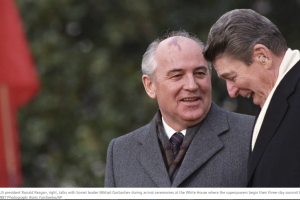Editor’s note — With news of Mikhail Gorbachev’s death, memories of the remarkable, historic actions of then-U.S. President Reagan, Russia’s leader at the time, Gorbachev, and England’s Margaret Thatcher come to mind…. especially the unlikely connection and even a level of friendship between Reagan and Gorbachev.
For those living in Soviet Russia at the time, the end of the Cold War ultimately ushered in a rush of fresh air, a hint of freedom, freedom to worship, but it did not happen overnight. It was not easy. There was no trust. People under communist rule live in fear, how else could the few control the many?
It was not easy before the historic, signed agreements between the U.S. and Soviet Russia. And it was not easy after.
Few, except those who lived there, could understand the profound difference these changes made in daily life. Not all at once, but over time.  It later led to the independence of so many captive countries who had been forced for many years to bend to the communist rule, to limited access to everyday items, food, commodities we take for granted in the U.S… and worse, such as no public worship allowed, stunningly beautiful Russian churches turned into museums or put to other uses.
It later led to the independence of so many captive countries who had been forced for many years to bend to the communist rule, to limited access to everyday items, food, commodities we take for granted in the U.S… and worse, such as no public worship allowed, stunningly beautiful Russian churches turned into museums or put to other uses.
The USSR (Union of Soviet Socialist Republics) had swallowed up Poland, East Germany, and so, so many other independent countries. Gorbachev’s decision to be open to conversation with the United States, with President Reagan, and Reagan’s focused clarity about our principles and what mattered most for human freedom to thrive, ultimately led restoration of independence to those countries held captive by the Soviet communist regime.
In East Germany alone—half of a country had been brutally divided with a wall that was intensely guarded by East German soldiers… a country in which families had been literally torn apart, East and West, and never allowed to see each other. From August 13,1961, until November 9, 1989, East Berlin had been separated from West Berlin by the Berlin Wall.
When Reagan declared “Tear down that wall!” the German citizens couldn’t tear it down fast enough!
Imagine suddenly being able to see your family and friends who lived on the other side, isolated, forced to live a fear-laden, scarce existence. … Prayer and Gorbachev’s openness to change and openness to have fruitful discussion with Reagan made that possible.
Gorbachev’s openness to change was miraculous in the eyes of most. As it turned out, the right leaders were in the right place at the right time it seems.
As an article from the Reason Foundation put it,
“Gorbachev’s economically desperate late-1980s policies of glasnost (openness) and perestroika (reform) unleashed a whirlwind of  freedom-seeking among hundreds of millions of captive peoples, quickly overwhelming any one man’s (or regime’s) ability to control it.
freedom-seeking among hundreds of millions of captive peoples, quickly overwhelming any one man’s (or regime’s) ability to control it.
And during most—though definitely not all—key moments of potential armed conflict between dictatorial hardliners and outgunned revolutionaries, Gorby told the generals to stand down.”
Today’s generation know little to nothing of that horrible time, nor of the Soviet expansion times that preceded it, though in recent years and months we have witnessed similar horrors in the abrupt, ill-planned surrender of Afghanistan to ISIS terrorists and the handing over of freedom-thriving Hong Kong to the Chinese communists.
I wonder whether the near-marxist-driven history revisionists who are allowed and encouraged to increasingly influence our children’s history textbooks allow such realities to be learned. … A reflection that brings us back to the remarkable, historic memory of Gorbachev and Reagan…
Below please find a few of the more interesting, culled articles on Michael Gorbachev:
- The Guardian —Former Reagan administration officials pay tribute to unlikely pair who shared a determination to pull the world back from the brink of a superpower war.
When Michael Reagan attended the 2004 funeral of his father, former US president Ronald Reagan, the man sitting behind him, he recalls, was the last leader of the Soviet Union: Mikhail Gorbachev.
“Mikhail Gorbachev and my wife and I became friends over the years,” Reagan said from Los Angeles on Tuesday after learning of the Russian’s death aged 91. “What I most remember is him telling me that every time my father and him met, my father would always end every meeting with, ‘If it’s God’s will’, and Mikhail Gorbachev would say to me, ‘I would look around the room to see if God was there’.”
Ronald Reagan and Gorbachev, capitalist and communist, were an unlikely pairing but their series of high profile summits have been praised for helping to end the cold war. Together they negotiated a landmark deal in 1987 to scrap intermediate-range nuclear missiles.
Former Reagan administration officials spoke on Tuesday of the leaders’ chemistry and shared a determination to pull the world back from the brink of a superpower war. They lauded Gorbachev as a Soviet leader who, unlike his implacable predecessors, was willing to constructively engage with Washington.
A new kind of Soviet leader
Reagan had branded the Soviet Union as the “evil empire” but his political soulmate, British prime minister Margaret Thatcher, declared in 1984: “I like Mr Gorbachev. We can do business together.” The following years, Reagan and Gorbachev held their first summit in Geneva.

Ken Adelman, who as Reagan’s director of arms control and attended the summit, recalled: “I was at lunch with him and he walks in and says, ‘This is a new kind of Soviet leader’. I was kind of amused because he had never met an old kind of Soviet leader but he was absolutely right.”
He added: “Reagan saw himself as a great negotiator and considered his life as one of great negotiations. He was very sad that, as he said, he couldn’t talk to all the Soviet leaders before Gorbachev ‘because they keep dying on me. What am I supposed to do?’”
Adelman, 76, author of Reagan at Reykjavik: Forty-Eight Hours that Ended the cold war, would not describe the men as friends but said they were always civil to each other. “What did it was that Ronald Reagan showed great backbone at the Reykjavik summit in 1986 when he walked out without destroying SDI – the Strategic Defense Initiative – when Gorbachev’s top priority was to destroy SDI.
“So I think Gorbachev admired Reagan. Reagan certainly liked Gorbachev because he was a new type of Soviet leader, one that he could deal with, and they saw… Read full article (recommended) >>
RELATED RESOURCES:
- October Man: Mikhail Gorbachev — Christopher R. O’Dea, Hoover Institution (Excellent read!)
- Gorbachev and Reagan: the capitalist and the communist who helped end the cold war — David Smith, The Guardian
Reagan and Gorbachev : How the Cold War Ended — 2004 —Ambassador Jack F. Matlock, former Special Assistant to the President for the Soviet Union during the Reagan Administration and the last US ambassador to the Soviet Union at the Wilson Center
- It wasn’t what he wanted, but Gorbachev allowed an evil empire to collapse — Matt Welch, Reason



You must be logged in to post a comment.